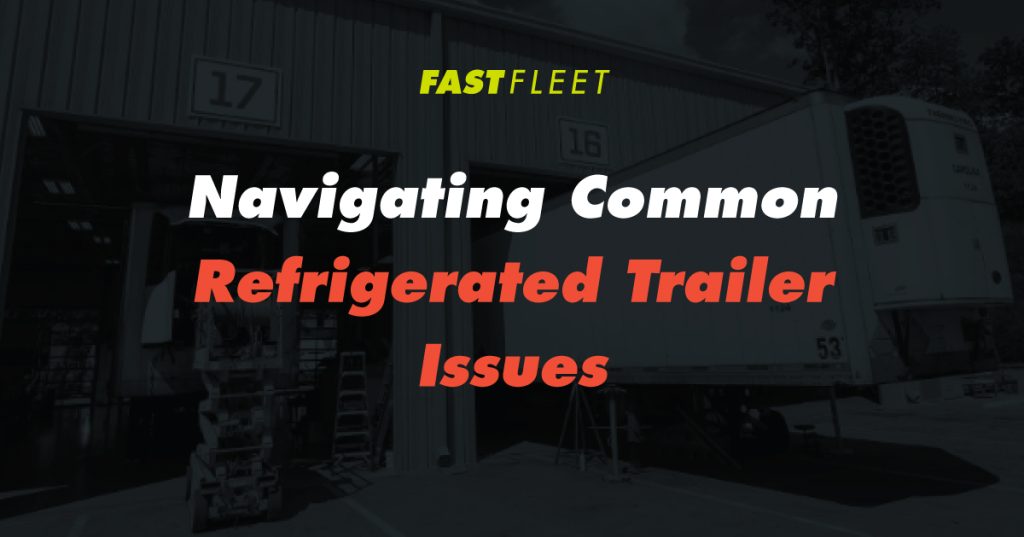Navigating Common Reefer Trailer Issues: Solutions for Compressor Failures, Coolant Leaks, and Electrical Problems
In the logistics and transportation industry, maintaining refrigerated trailers, commonly known as reefers, is critical to ensuring the safe and efficient transport of perishable goods.
These trailers play a pivotal role in the supply chain, helping to preserve the quality of food products, pharmaceuticals, and other temperature-sensitive commodities during transit.
However, like any complex mechanical system, reefers are prone to a variety of issues that can jeopardize their operation.
Common problems such as compressor failures, coolant leaks, and electrical issues can lead to significant downtime and potentially spoil valuable cargo.
Fast Fleet recognizes the urgency of these challenges and provides expert solutions to mitigate them, ensuring minimal downtime and safeguarding perishable goods.
Understanding Reefer Trailers
A refrigerated trailer is a temperature-controlled shipping container used extensively across the transportation industry to move perishable goods.
Key components of a reefer include the refrigeration unit, insulation panels, and the mechanical systems that control temperature and airflow.
The effectiveness of a reefer largely depends on its ability to maintain a constant temperature, regardless of external weather conditions.
This is achieved through a sophisticated cooling mechanism powered by a compressor, and an integrated electrical system that monitors and adjusts internal conditions.
Common Issues in Reefer Trailer Maintenance
Compressor Failures
The compressor is the heart of the refrigeration system in a reefer trailer, responsible for circulating refrigerant and maintaining the desired temperature. When a compressor fails, it can lead to a complete loss of cooling capability.
Common symptoms of compressor failure include unusual noises, reduced cooling capacity, or system alerts.
Causes can range from inadequate maintenance, such as failing to clean condensers, to low refrigerant levels or electrical faults. Fast Fleet’s technicians are trained to conduct thorough diagnostics to pinpoint the exact cause of compressor malfunctions.
Solutions typically involve repairing or replacing the compressor unit and addressing any associated system issues to restore full functionality.
Coolant Leaks
Maintaining the right level and quality of coolant is essential for the optimal operation of refrigerated trailers. Coolant leaks can lead to insufficient cooling and increased fuel consumption.
Signs of a coolant leak might include visible puddles under the trailer, a drop in coolant levels, or fluctuations in internal temperatures.
Diagnosing a coolant leak involves checking for damaged hoses, loose connections, or failed seals.
Electrical Problems
Electrical systems in reefers control everything from the basic operation of the cooling unit to the detailed monitoring systems that track and record temperature data.
Electrical issues can manifest as intermittent power losses, failure of digital displays, or unresponsive controls.
Common electrical problems include blown fuses, corroded connectors, or wiring issues. Troubleshooting these problems requires a systematic check of the electrical circuitry.
Preventive Measures and Maintenance Tips
Regular Maintenance Checks
To prevent common issues that afflict refrigerated trailers, such as compressor failures and coolant leaks, regular maintenance checks are crucial.
These checks should include monitoring the refrigeration unit for proper operation, inspecting seals and hoses for leaks, and ensuring electrical systems are functioning correctly.
Implementing a routine checkup schedule helps identify potential problems before they lead to significant damage or failure.
Preventative Strategies
The longevity of reefer trailers can be significantly extended through proactive maintenance strategies. This includes:
- Regularly cleaning and testing the refrigeration units to ensure they are operating at optimal efficiency.
- Checking and topping up coolant levels to prevent overheating and system damage.
- Ensuring that the trailer’s insulation is intact to maintain required temperatures efficiently.
Role of Regular Inspections and Maintenance Schedules
Adhering to a regular inspection and maintenance schedule is key to preventing cargo damage and losses.
These schedules allow for the systematic review of all critical components of the refrigerated trailer, ensuring that any issues are addressed promptly.
Regular inspections help maintain the reliability of the trailers, ensuring that temperature-sensitive cargo is transported without risk of spoilage, thus maintaining cargo integrity and customer trust.
Maintaining refrigerated trailers is not just about preventing breakdowns; it’s about ensuring the safety, reliability, and efficiency of the transportation of perishable goods.
Neglect in maintaining these trailers can lead to severe consequences, including cargo spoilage and significant financial losses.
By choosing a reliable service provider like Fast Fleet, companies can ensure that their fleet remains in peak condition, reducing the likelihood of unexpected repairs and extending the service life of their equipment.
Ensure your refrigerated trailers are maintained to the highest standards with Fast Fleet’s comprehensive maintenance services.
Don’t wait for a breakdown to disrupt your operations; proactive maintenance is key to operational excellence and customer satisfaction.
Contact Fast Fleet today to schedule a service or visit our services page for more information on how we can help keep your fleet running smoothly and efficiently.
















